DevOops yesterday and today
Today we will talk a little about the present, the future and about the program of the DevOops 2019 conference. DevOps is changing every day. Do you remember the year 2004? We have a speaker who worked with clouds at a time when there was no such term. Amazon Web Services launched in 2006. Around the same time, the first mentions of “DevOps” began to appear. A whole life has passed since then.
Recently, again recalled "return my 2007". Imagine this world without ubiquitous virtual computers on Amazon, without GitHub (it appeared only in 2008), without cozy and safe dockers. Remember setting iptables, GNU / Linux package managers, manually rebuilding kernel modules, sleepless nights. Still want to go there? That would be your 2019 if it were not for the hurricane progress of these years.

')
Changed technology and company. I will give a couple of examples. For example, we all saw the miraculous transformation of Microsoft - from Ballmer's “ Linux is Cancer ” in 2001 to the ubiquitous transition to open source, saving GitHub in 2018 and plans in the summer of 2019 to present the Linux kernel as part of the Windows delivery. Together with all this movement, the preferences of engineers regarding the information received also changed.
In 2016, the Google book “ Site Reliability Engineering ” appeared. On the one hand, this book, neither then nor now, can be considered a tool for everyone — after all, “ you are not Google ,” you do not have Borg, and there may not be any such tasks. In fact, initially being a product of smart Google PR, it did have a global effect. Few have read or heard of it. In August 2018, we were overtaken by its Russian-language translation along with the continuation of the “ Site Reliability Workbook ”.
Conferences are constantly changing with conjuncture. Appearing in 2017, the DevOops conference in its program reflected the main issues that were occupied by DevOps solutions specialists at that time. An archival copy for 2017 will not lie: containers, orchestration and virtualization, including Docker and AWS, were the first item. Docker, Docker, Docker everywhere. We brought people who could talk about this endlessly, and the conference was opened by Cory Quinn, editor of Last Week in AWS .
In 2018 it became clear that everyone was already fed up with Docker. He became the standard, he began to look at us from everywhere. New posts in “Last Week in AWS” began to appear more often than 60 times a day. It no longer makes sense to build a conference around such obvious things. Keynout in 2018 was made by John Willis - a man famous not only as a director for Docker ecosystem development, but also as one of DevOps' original fathers, the author of the DevOps Handbook and Beyond the Phoenix Project. It's nice that John didn’t start talking about tuling, as always, but about the issues of introducing DevOps as an organizational culture - a topic that is constantly forgotten, being distracted by the bright toys of new technologies.
The second main theme of 2018 is Kubernetes. How to use it, how to implement it, is it worth it at all? This topic was a red line throughout the program, Kubernetes was, if not in the title, then no, no, and it appeared on slides.
Hi, 2019. Kubernetes, like the Docker once, has become the standard. The hot wars died down, the victims of early implants disappeared from the eyes, and only he remained on the battlefield. All new projects are being made one way or another with an eye on the new king.
And along with this, the question arises: what should the DevOops conference tell this year? This is an open question, which the program committee is dealing with right now.
The conference program can be presented in two ways. First of all, you can immediately present a finished report grid and say - look how cool. This produces a wow effect, leads to a quick purchase of tickets, but does not always fully respond to visitors' requests.
For example, recently a friend wrote to me on VKontakte and asked me to tell what will be in the program. “But after all, there is still half a year before the conference, why do you need this?” It turned out that it’s customary in her company to write a poem on the topic “why I want to go to the conference” in advance. And since the company is large, everything is planned strongly in advance, then you need to write in six months. She absolutely does not fit the option "the program will be a month before the start."
This may seem like a particular case, but out of the multitude of such particular cases, the overall picture is formed. There is another approach: instead of the final snapshot of the program, you can upload updates in small pieces. This is something agile and lean. If you remember, there is such a concept of value-stream mapping , and although it does not quite apply to the consumption of announcements of reports on Habré, there is something similar. For example, if we dump too much text, you simply cannot read it, and you will need to remember what you read until the next time. Report descriptions are corrected and updated from time to time, speakers change the names of topics as they work on the report, and it is completely difficult to understand this flow of information and even more so turn it into an understanding of "what do I need for this conference." In other words, to publish the program in pieces as it is filled is good.
Now we have posted on the site some of the first speakers, which will definitely be on DevOops 2019. Soon the topics of the reports will appear. In order not to miss anything, you can read our blog on Habré or subscribe to the mailing list (to do this, go to the conference site and click the "subscribe" button there). If you suddenly want to make a report yourself - you still have such an opportunity .
And yet, what are the reports? See how the conference description has changed. Kubernetes is still in the first place, but not as an independent discipline, but as part of the Cloud Native movement, next to Helm, Istio and service meshes. Notice that the word Observability appeared in the third place in an explicit form (for example, in Mike Julian's book Practical Monitoring, this word has not yet been used, a year has passed and now). Reports will be about in that direction. Of course, the old topics about Docker and Kubernetes will also skip, but at a higher level.
I also have ideas on this topic. For example, for me, DevOps was always first and foremost a methodology and a culture, and not a set of tuling. You roll out your enterprise Java web app on the customer’s servers, but it doesn’t roll out, something broke, and you need to instantly find out and fix everything. And it is better to do so that rolling out the prod was not a nightmare. That's about this conference - how not to have nightmares with the people and releases. What tools it will be done - is the second question, we are cool and can handle any. I myself would like more reports on culture and ways of doing things - good, even in the original list of speakers there are such people (for example, Anton Weiss, Baruch Sadogursky, Roman Shaposhnik).
In general, enough common words, let's get down to business! Here are our speakers:
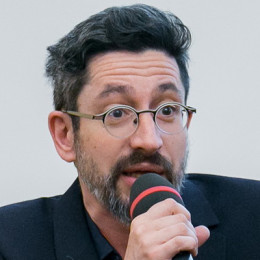 Anton Weiss is a co-owner of technology consulting Otomato Software, with more than 15 years of experience in high technology. He is an expert in technical teaching, the initiator and co-author of the first in Israel DevOps certification course. Anton participates in international conferences and is known as a cool speaker. At DevOops 2018, his report ranked first!
Anton Weiss is a co-owner of technology consulting Otomato Software, with more than 15 years of experience in high technology. He is an expert in technical teaching, the initiator and co-author of the first in Israel DevOps certification course. Anton participates in international conferences and is known as a cool speaker. At DevOops 2018, his report ranked first!
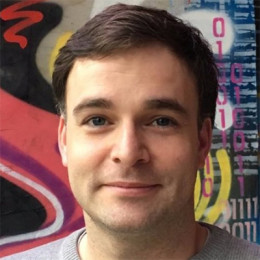 Eric Veld from HashiCorp has been involved in cloud infrastructure for more than 15 years. Prior to HashiCorp, he worked as a consultant at Xebia and became the founder of Instruqt, a platform for learning cloud tulling and other DevOps tools on the actual infrastructure itself.
Eric Veld from HashiCorp has been involved in cloud infrastructure for more than 15 years. Prior to HashiCorp, he worked as a consultant at Xebia and became the founder of Instruqt, a platform for learning cloud tulling and other DevOps tools on the actual infrastructure itself.
 Alex Thissen from Xpirit has been developing since the late 90s and managed to work as a lead and architect everywhere - from small startups to huge enterprises. In particular, he is engaged in training developers in Microsoft technologies, and architects in modern distributed cloud-based systems. Tenfold Microsoft Most Valuable Professional in the category of Studio and Development Technologies.
Alex Thissen from Xpirit has been developing since the late 90s and managed to work as a lead and architect everywhere - from small startups to huge enterprises. In particular, he is engaged in training developers in Microsoft technologies, and architects in modern distributed cloud-based systems. Tenfold Microsoft Most Valuable Professional in the category of Studio and Development Technologies.
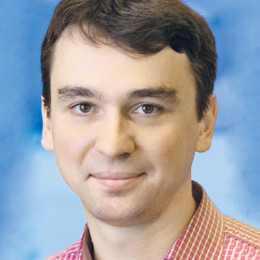 Roman Shaposhnik from ZEDEDA is a renowned expert and consultant on open source and the transition to digital technologies in large companies. Previously, he played a major role in shaping open source collaboration within the Linux Foundation, and also held key positions at Pivotal, working mainly with big data and cloud application management platforms. His work at Pivotal brought him to the interface of container technologies, virtualization and unikernel architectures, which, in turn, gave rise to the mission of ZEDEDA - to apply these technologies to developing peripheral computing (edge computing). Roman is a board member of the Apache Software Foundation and Linux Foundation Edge, as well as an active contributor to a number of open source projects.
Roman Shaposhnik from ZEDEDA is a renowned expert and consultant on open source and the transition to digital technologies in large companies. Previously, he played a major role in shaping open source collaboration within the Linux Foundation, and also held key positions at Pivotal, working mainly with big data and cloud application management platforms. His work at Pivotal brought him to the interface of container technologies, virtualization and unikernel architectures, which, in turn, gave rise to the mission of ZEDEDA - to apply these technologies to developing peripheral computing (edge computing). Roman is a board member of the Apache Software Foundation and Linux Foundation Edge, as well as an active contributor to a number of open source projects.
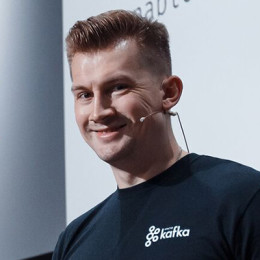 Victor Gamov - Developer Advocate at Confluent, which is the leading contributor to the Apache Kafka project. Helps architects and developers to design and develop distributed systems for processing streaming data. Co-author of the book "Enterprise Web Development" publisher O'Reilly. Co-founder and (in the past) the leader of the correct podcast “Debriefing”, beloved by many programmers.
Victor Gamov - Developer Advocate at Confluent, which is the leading contributor to the Apache Kafka project. Helps architects and developers to design and develop distributed systems for processing streaming data. Co-author of the book "Enterprise Web Development" publisher O'Reilly. Co-founder and (in the past) the leader of the correct podcast “Debriefing”, beloved by many programmers.
 Anton Arkhipov - Developer Advocate in the company JetBrains, a resident of the podcast "Debriefing" . Professional interests are related to programming languages and software development tools.
Anton Arkhipov - Developer Advocate in the company JetBrains, a resident of the podcast "Debriefing" . Professional interests are related to programming languages and software development tools.
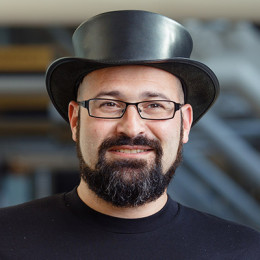 Baruch Sadogursky (aka JBaruch) - Head of Developer Relations and Developer Advocate at JFrog. Most of all he likes to talk about technologies - that is, he just likes to chat, but a person who speaks about technologies has a smart look, and 18 years of experience in the field of high technologies has not gone away. When he does not speak (well, or does not fly to the place of the next performance), he studies technologies, people and how they work, more precisely, do not work together. Baruch is a co-author of the book Liquid Software, a CNCF ambassador and a professional speaker on topics such as DevOps, DevSecOps, Go, Java, etc. He regularly speaks at such famous conferences as Joker, JPoint, DevOops, Heisenbug, DockerCon, GopherCon, Devoxx, DevOps Days, OSCON, Qcon, JavaOne, etc. Some of his reports can be viewed here .
Baruch Sadogursky (aka JBaruch) - Head of Developer Relations and Developer Advocate at JFrog. Most of all he likes to talk about technologies - that is, he just likes to chat, but a person who speaks about technologies has a smart look, and 18 years of experience in the field of high technologies has not gone away. When he does not speak (well, or does not fly to the place of the next performance), he studies technologies, people and how they work, more precisely, do not work together. Baruch is a co-author of the book Liquid Software, a CNCF ambassador and a professional speaker on topics such as DevOps, DevSecOps, Go, Java, etc. He regularly speaks at such famous conferences as Joker, JPoint, DevOops, Heisenbug, DockerCon, GopherCon, Devoxx, DevOps Days, OSCON, Qcon, JavaOne, etc. Some of his reports can be viewed here .
Recently, again recalled "return my 2007". Imagine this world without ubiquitous virtual computers on Amazon, without GitHub (it appeared only in 2008), without cozy and safe dockers. Remember setting iptables, GNU / Linux package managers, manually rebuilding kernel modules, sleepless nights. Still want to go there? That would be your 2019 if it were not for the hurricane progress of these years.

')
Changed technology and company. I will give a couple of examples. For example, we all saw the miraculous transformation of Microsoft - from Ballmer's “ Linux is Cancer ” in 2001 to the ubiquitous transition to open source, saving GitHub in 2018 and plans in the summer of 2019 to present the Linux kernel as part of the Windows delivery. Together with all this movement, the preferences of engineers regarding the information received also changed.
In 2016, the Google book “ Site Reliability Engineering ” appeared. On the one hand, this book, neither then nor now, can be considered a tool for everyone — after all, “ you are not Google ,” you do not have Borg, and there may not be any such tasks. In fact, initially being a product of smart Google PR, it did have a global effect. Few have read or heard of it. In August 2018, we were overtaken by its Russian-language translation along with the continuation of the “ Site Reliability Workbook ”.
Conferences are constantly changing with conjuncture. Appearing in 2017, the DevOops conference in its program reflected the main issues that were occupied by DevOps solutions specialists at that time. An archival copy for 2017 will not lie: containers, orchestration and virtualization, including Docker and AWS, were the first item. Docker, Docker, Docker everywhere. We brought people who could talk about this endlessly, and the conference was opened by Cory Quinn, editor of Last Week in AWS .
In 2018 it became clear that everyone was already fed up with Docker. He became the standard, he began to look at us from everywhere. New posts in “Last Week in AWS” began to appear more often than 60 times a day. It no longer makes sense to build a conference around such obvious things. Keynout in 2018 was made by John Willis - a man famous not only as a director for Docker ecosystem development, but also as one of DevOps' original fathers, the author of the DevOps Handbook and Beyond the Phoenix Project. It's nice that John didn’t start talking about tuling, as always, but about the issues of introducing DevOps as an organizational culture - a topic that is constantly forgotten, being distracted by the bright toys of new technologies.
The second main theme of 2018 is Kubernetes. How to use it, how to implement it, is it worth it at all? This topic was a red line throughout the program, Kubernetes was, if not in the title, then no, no, and it appeared on slides.
Hi, 2019. Kubernetes, like the Docker once, has become the standard. The hot wars died down, the victims of early implants disappeared from the eyes, and only he remained on the battlefield. All new projects are being made one way or another with an eye on the new king.
And along with this, the question arises: what should the DevOops conference tell this year? This is an open question, which the program committee is dealing with right now.
The conference program can be presented in two ways. First of all, you can immediately present a finished report grid and say - look how cool. This produces a wow effect, leads to a quick purchase of tickets, but does not always fully respond to visitors' requests.
For example, recently a friend wrote to me on VKontakte and asked me to tell what will be in the program. “But after all, there is still half a year before the conference, why do you need this?” It turned out that it’s customary in her company to write a poem on the topic “why I want to go to the conference” in advance. And since the company is large, everything is planned strongly in advance, then you need to write in six months. She absolutely does not fit the option "the program will be a month before the start."
This may seem like a particular case, but out of the multitude of such particular cases, the overall picture is formed. There is another approach: instead of the final snapshot of the program, you can upload updates in small pieces. This is something agile and lean. If you remember, there is such a concept of value-stream mapping , and although it does not quite apply to the consumption of announcements of reports on Habré, there is something similar. For example, if we dump too much text, you simply cannot read it, and you will need to remember what you read until the next time. Report descriptions are corrected and updated from time to time, speakers change the names of topics as they work on the report, and it is completely difficult to understand this flow of information and even more so turn it into an understanding of "what do I need for this conference." In other words, to publish the program in pieces as it is filled is good.
Now we have posted on the site some of the first speakers, which will definitely be on DevOops 2019. Soon the topics of the reports will appear. In order not to miss anything, you can read our blog on Habré or subscribe to the mailing list (to do this, go to the conference site and click the "subscribe" button there). If you suddenly want to make a report yourself - you still have such an opportunity .
And yet, what are the reports? See how the conference description has changed. Kubernetes is still in the first place, but not as an independent discipline, but as part of the Cloud Native movement, next to Helm, Istio and service meshes. Notice that the word Observability appeared in the third place in an explicit form (for example, in Mike Julian's book Practical Monitoring, this word has not yet been used, a year has passed and now). Reports will be about in that direction. Of course, the old topics about Docker and Kubernetes will also skip, but at a higher level.
I also have ideas on this topic. For example, for me, DevOps was always first and foremost a methodology and a culture, and not a set of tuling. You roll out your enterprise Java web app on the customer’s servers, but it doesn’t roll out, something broke, and you need to instantly find out and fix everything. And it is better to do so that rolling out the prod was not a nightmare. That's about this conference - how not to have nightmares with the people and releases. What tools it will be done - is the second question, we are cool and can handle any. I myself would like more reports on culture and ways of doing things - good, even in the original list of speakers there are such people (for example, Anton Weiss, Baruch Sadogursky, Roman Shaposhnik).
In general, enough common words, let's get down to business! Here are our speakers:
 Anton Weiss is a co-owner of technology consulting Otomato Software, with more than 15 years of experience in high technology. He is an expert in technical teaching, the initiator and co-author of the first in Israel DevOps certification course. Anton participates in international conferences and is known as a cool speaker. At DevOops 2018, his report ranked first!
Anton Weiss is a co-owner of technology consulting Otomato Software, with more than 15 years of experience in high technology. He is an expert in technical teaching, the initiator and co-author of the first in Israel DevOps certification course. Anton participates in international conferences and is known as a cool speaker. At DevOops 2018, his report ranked first! Eric Veld from HashiCorp has been involved in cloud infrastructure for more than 15 years. Prior to HashiCorp, he worked as a consultant at Xebia and became the founder of Instruqt, a platform for learning cloud tulling and other DevOps tools on the actual infrastructure itself.
Eric Veld from HashiCorp has been involved in cloud infrastructure for more than 15 years. Prior to HashiCorp, he worked as a consultant at Xebia and became the founder of Instruqt, a platform for learning cloud tulling and other DevOps tools on the actual infrastructure itself. Alex Thissen from Xpirit has been developing since the late 90s and managed to work as a lead and architect everywhere - from small startups to huge enterprises. In particular, he is engaged in training developers in Microsoft technologies, and architects in modern distributed cloud-based systems. Tenfold Microsoft Most Valuable Professional in the category of Studio and Development Technologies.
Alex Thissen from Xpirit has been developing since the late 90s and managed to work as a lead and architect everywhere - from small startups to huge enterprises. In particular, he is engaged in training developers in Microsoft technologies, and architects in modern distributed cloud-based systems. Tenfold Microsoft Most Valuable Professional in the category of Studio and Development Technologies. Roman Shaposhnik from ZEDEDA is a renowned expert and consultant on open source and the transition to digital technologies in large companies. Previously, he played a major role in shaping open source collaboration within the Linux Foundation, and also held key positions at Pivotal, working mainly with big data and cloud application management platforms. His work at Pivotal brought him to the interface of container technologies, virtualization and unikernel architectures, which, in turn, gave rise to the mission of ZEDEDA - to apply these technologies to developing peripheral computing (edge computing). Roman is a board member of the Apache Software Foundation and Linux Foundation Edge, as well as an active contributor to a number of open source projects.
Roman Shaposhnik from ZEDEDA is a renowned expert and consultant on open source and the transition to digital technologies in large companies. Previously, he played a major role in shaping open source collaboration within the Linux Foundation, and also held key positions at Pivotal, working mainly with big data and cloud application management platforms. His work at Pivotal brought him to the interface of container technologies, virtualization and unikernel architectures, which, in turn, gave rise to the mission of ZEDEDA - to apply these technologies to developing peripheral computing (edge computing). Roman is a board member of the Apache Software Foundation and Linux Foundation Edge, as well as an active contributor to a number of open source projects. Victor Gamov - Developer Advocate at Confluent, which is the leading contributor to the Apache Kafka project. Helps architects and developers to design and develop distributed systems for processing streaming data. Co-author of the book "Enterprise Web Development" publisher O'Reilly. Co-founder and (in the past) the leader of the correct podcast “Debriefing”, beloved by many programmers.
Victor Gamov - Developer Advocate at Confluent, which is the leading contributor to the Apache Kafka project. Helps architects and developers to design and develop distributed systems for processing streaming data. Co-author of the book "Enterprise Web Development" publisher O'Reilly. Co-founder and (in the past) the leader of the correct podcast “Debriefing”, beloved by many programmers. Anton Arkhipov - Developer Advocate in the company JetBrains, a resident of the podcast "Debriefing" . Professional interests are related to programming languages and software development tools.
Anton Arkhipov - Developer Advocate in the company JetBrains, a resident of the podcast "Debriefing" . Professional interests are related to programming languages and software development tools. Baruch Sadogursky (aka JBaruch) - Head of Developer Relations and Developer Advocate at JFrog. Most of all he likes to talk about technologies - that is, he just likes to chat, but a person who speaks about technologies has a smart look, and 18 years of experience in the field of high technologies has not gone away. When he does not speak (well, or does not fly to the place of the next performance), he studies technologies, people and how they work, more precisely, do not work together. Baruch is a co-author of the book Liquid Software, a CNCF ambassador and a professional speaker on topics such as DevOps, DevSecOps, Go, Java, etc. He regularly speaks at such famous conferences as Joker, JPoint, DevOops, Heisenbug, DockerCon, GopherCon, Devoxx, DevOps Days, OSCON, Qcon, JavaOne, etc. Some of his reports can be viewed here .
Baruch Sadogursky (aka JBaruch) - Head of Developer Relations and Developer Advocate at JFrog. Most of all he likes to talk about technologies - that is, he just likes to chat, but a person who speaks about technologies has a smart look, and 18 years of experience in the field of high technologies has not gone away. When he does not speak (well, or does not fly to the place of the next performance), he studies technologies, people and how they work, more precisely, do not work together. Baruch is a co-author of the book Liquid Software, a CNCF ambassador and a professional speaker on topics such as DevOps, DevSecOps, Go, Java, etc. He regularly speaks at such famous conferences as Joker, JPoint, DevOops, Heisenbug, DockerCon, GopherCon, Devoxx, DevOps Days, OSCON, Qcon, JavaOne, etc. Some of his reports can be viewed here .DevOops 2019 Conference will be held October 29-30 in St. Petersburg.
Come, it will be cool and useful!
Early bird tickets can be purchased on the conference website .
Source: https://habr.com/ru/post/454626/
All Articles